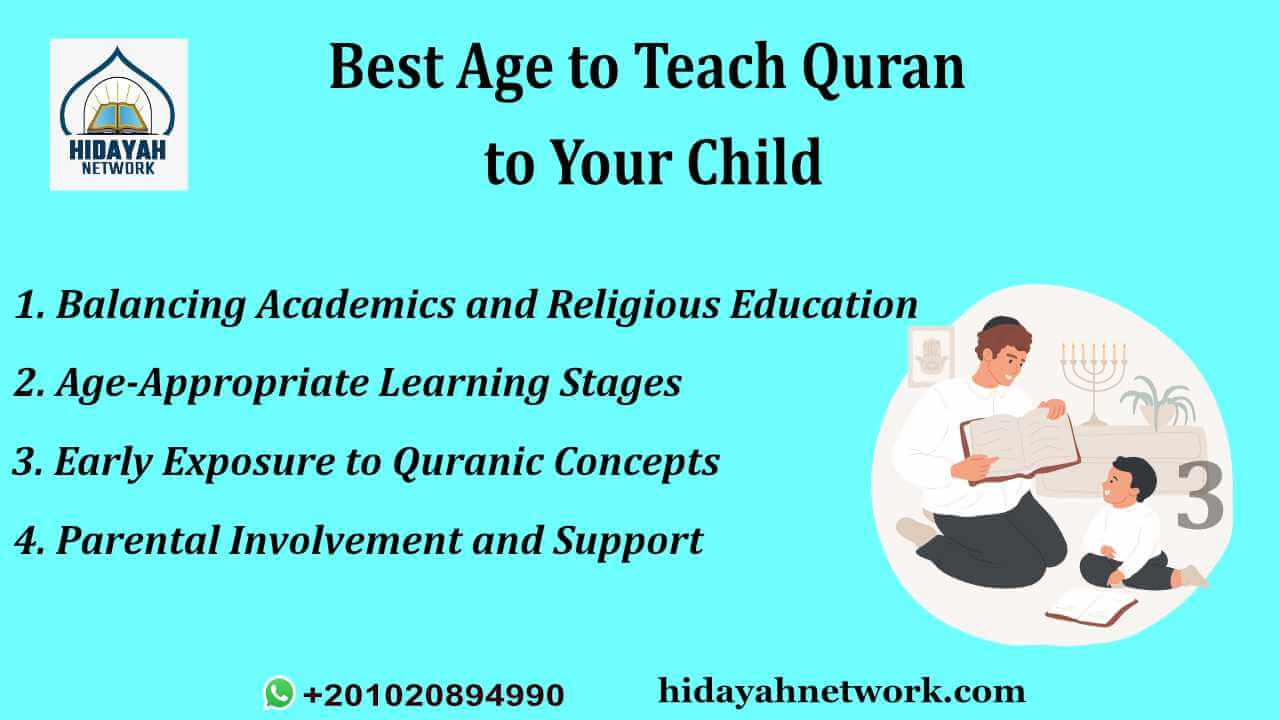Best Age to Teach Quran to Your Child

- Hidayah
- Network
- | Role: Hidayah Network

Teaching your child the Quran is a significant step in their spiritual and moral development. Here, we’ll guide you through the importance of this developmental stage and provide practical insights on how, as a parent, you can initiate this crucial aspect of their upbringing.
Many parents grapple with the question, “When should I start?” The truth is, there isn’t a fixed age for introducing the Quran to your child. However, the optimal time tends to be between 5 and 7 years old. Children are establishing habits that can shape their character at this age, and their memory is at its sharpest. Let’s discover more in detail here!
Table of Contents
ToggleWhen Should Teach Child Quran, Best Age for Them
Deciding the right time to teach your child the Quran isn’t set in stone, as it depends on their abilities and how they’re taught. Usually, starting between 5 and 7 years old works well. This is when kids form habits that shape who they are, and their memory is super sharp.
As Prophet Muhammad (peace be upon him) emphasized, “Command your children to pray when they become seven years old and beat them [lightly] for it (prayer) when they become ten years old.” This hadith underscores the importance of instilling religious practices, including Quranic teachings, in a child’s early years.
The Best Way to Start Teaching the Quran to Your Kids
When teaching your kids the Quran, begin with Noorani Qaida, a beginner’s guide. Next, focus on learning to read the Quran and start with the simpler chapters. Also, introduce them to their favorite verses, making them engage. However, enrolling your child in professional Quran classes for kids is the best way.
Hidayah Network is one such platform that provides an excellent learning environment for kids. They provide a marvelous setting for Quranic education, ensuring your child grasps the teachings effectively and enthusiastically.
Get 40% OFF Now!
4 Determining Factors for the Best Time to Teach Quran to Your Child
1. Early Exposure to Quranic Concepts
Introducing Quranic concepts early lays a foundation for spiritual growth. Expose your child to simple verses, fostering familiarity with the Quran’s essence.
Prophet Muhammad (peace be upon him) highlighted the significance of early exposure, stating,
“The example of the one who reads the Quran and memorizes it is like a citrus fruit that tastes good and smells good.”
So we can analyze the benefits of learning quran for kids in young age.
2. Age-Appropriate Learning Stages
Tailor the Quranic education to age-appropriate stages. Younger children benefit from interactive and visual approaches, gradually transitioning to more in-depth study as they grow.
Aligning the teachings with their developmental milestones ensures a meaningful understanding.
3. Balancing Academics and Religious Education
Striking a balance between academic pursuits and religious education is vital. Integrate Quranic teachings into daily routines, emphasizing the harmonious coexistence of secular and spiritual knowledge. In the Hifz course for kids, childern can know all about quran and religious education.
4. Parental Involvement and Support
Active parental involvement is paramount and helpful for kids to become a hafiz. Please support your child’s Quranic education by engaging in discussions, participating in their learning, and fostering a positive environment.
The Prophet Muhammad (peace be upon him) affirmed,
“The best gift a father can give to his child is education and upbringing.”
Conclusion
Determining the best time to teach your child the Quran involves considering factors like early exposure to Quranic concepts, aligning education with age-appropriate stages, maintaining a balance between academics and religious learning, and active parental involvement.
These elements collectively shape a holistic approach to nurturing your child’s spiritual growth. By recognizing the significance of these factors, parents can create an enriching environment that fosters a lifelong connection with the Quran.

About Author
